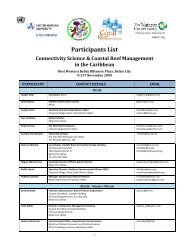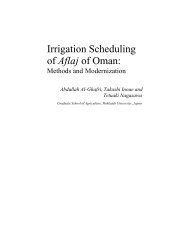The Global Water Crisis: Addressing an Urgent Security - Unu-inweh ...
The Global Water Crisis: Addressing an Urgent Security - Unu-inweh ...
The Global Water Crisis: Addressing an Urgent Security - Unu-inweh ...
You also want an ePaper? Increase the reach of your titles
YUMPU automatically turns print PDFs into web optimized ePapers that Google loves.
one <strong>an</strong>d has yet to attain widespread achievement. Consistent exclusion of women or other marginalized groups from<br />
these discussions, processes <strong>an</strong>d roles me<strong>an</strong>s that there is inequity in the outcomes of interventions, <strong>an</strong>d poverty has<br />
persisted amongst certain rural communities <strong>an</strong>d marginalized groups. <strong>The</strong> result is that large numbers of people have<br />
not been able to cross the divide out of subsistence agriculture into making a profitable livelihood due to limitations over<br />
which they have no control.<br />
4. How Should We Invest in <strong>Water</strong> Today?<br />
Agricultural water is a key aspect of the development challenge, <strong>an</strong>d is <strong>an</strong> import<strong>an</strong>t entry point for addressing poverty<br />
<strong>an</strong>d environmental issues. <strong>The</strong>re is potential to greatly reduce the environmental impact of agriculture while improving<br />
the livelihoods of rural communities.<br />
Where there is economic scarcity, investments in infrastructure are urgently needed. However, such investments must no<br />
longer take the form of large dams, but rather should encompass a wide r<strong>an</strong>ge of storage options, from better soil <strong>an</strong>d<br />
water m<strong>an</strong>agement to groundwater recharge, from small t<strong>an</strong>ks <strong>an</strong>d ponds to large dams. Improving storage essentially<br />
me<strong>an</strong>s improving farmers’ control of water — a critical way to aid in the adaptation to variability from climate ch<strong>an</strong>ge.<br />
By looking at options from a r<strong>an</strong>ge of perspectives, including costs, it ensures that solutions better match the problems<br />
they are intended to address.<br />
In places with physical scarcity, investment is also needed in some similar forms of storage so that farmers have better<br />
control of water, as water control is key to increasing agricultural productivity with the same or less water input. It also<br />
me<strong>an</strong>s investing in new institutions <strong>an</strong>d solutions for dem<strong>an</strong>d m<strong>an</strong>agement (Chartres <strong>an</strong>d Varma, 2010). Investment in<br />
innovative water <strong>an</strong>d l<strong>an</strong>d m<strong>an</strong>agement practices that encourage better water use more sustainably would also help to<br />
increase agricultural productivity. It is especially import<strong>an</strong>t that when policy advocates for a ch<strong>an</strong>ge in practices in areas<br />
that are environmentally fragile <strong>an</strong>d support a large number of the vulnerable <strong>an</strong>d poor, it is mindful of the precarious<br />
livelihoods of such communities. <strong>The</strong>re are very real trade-offs involved, particularly for the very poor, when ch<strong>an</strong>ge is<br />
prescribed on the grounds of sustainability.<br />
While it is easy to propose better institutions <strong>an</strong>d policies, implementation is rarely as easy, as ch<strong>an</strong>ge in water use is<br />
often surrounded by a complex political economy. However, this does not me<strong>an</strong> that ch<strong>an</strong>ge is not possible; it only me<strong>an</strong>s<br />
that political constraints must also be recognized in crafting new models. An example of this was demonstrated by the<br />
Jyotigram scheme in Gujarat in India, in which a power subsidy was created that encouraged groundwater extraction, but<br />
later could not be ch<strong>an</strong>ged due to political lobbies (Shah et al., 2008). Later, <strong>an</strong> alternative approach was found in which<br />
the government separated electricity supplies for agriculture <strong>an</strong>d household use. Although supplies to farmers were<br />
rationed, the approach was accepted because the quality of power supply was improved. <strong>The</strong> end result was a reduction<br />
in groundwater overdraft as well as electricity waste (Shah et al., 2008).<br />
Conclusions<br />
<strong>The</strong> goal to meet food needs while supporting social <strong>an</strong>d economic development <strong>an</strong>d simult<strong>an</strong>eously minimizing<br />
environmental degradation requires a mainstreaming of water issues. Agricultural water intersects with m<strong>an</strong>y other<br />
sectors <strong>an</strong>d is also increasingly impacted by competing water use in other sectors. While the world will continue to face<br />
the task of producing more food to meet its future needs, there is growing pressure to ensure that business-as-usual<br />
approaches to water use in agriculture ch<strong>an</strong>ge. <strong>The</strong>re is vocal concern from both environmentalists about the state of<br />
rivers <strong>an</strong>d wetl<strong>an</strong>ds, <strong>an</strong>d from governments who are faced with persistent poverty in rural areas where development in<br />
water infrastructure has not delivered its promised tr<strong>an</strong>sformations. Investment in water as a solution to addressing these<br />
development challenges presents a new way of looking at agricultural water – as <strong>an</strong> enabler of wise use <strong>an</strong>d tr<strong>an</strong>sformation.<br />
98 <strong>The</strong> <strong>Global</strong> <strong>Water</strong> <strong>Crisis</strong>: <strong>Addressing</strong> <strong>an</strong> <strong>Urgent</strong> <strong>Security</strong> Issue




